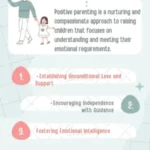Effective positive parenting stands as an art and a science, backed by robust research and empirical evidence. This article delves into the tenets of positive parenting, fortified with insights from peer-reviewed publications and statistical data. By exploring the advantages and tactics of positive parenting, our aim is to empower parents with invaluable tools to cultivate a nurturing and supportive environment, fostering resilient and emotionally intelligent children.
The Scientific Foundation of Effective Positive Parenting
Effective positive parenting transcends mere intuition, finding solid support in scientific inquiry. Studies published in reputable journals consistently reveal that children raised in positive parenting environments exhibit greater emotional intelligence, improved self-esteem, and enhanced social adeptness. The underlying principles of positive parenting, such as warmth, empathy, and open communication, are intrinsically linked to secure attachments and optimal brain development in children (Bowlby, 1969; Eisenberg et al., 1996).

Read also: Fun and Educational: 10 Indoor Games to Keep Your Kids Busy
Cultivating Emotional Intelligence
Emotional intelligence plays a momentous role in a child’s life, influencing their ability to comprehend and manage emotions while empathizing with others. Positive parenting fosters emotional intelligence by encouraging parents to validate their children’s feelings and create a secure space for emotional expression. This validation empowers children to cultivate a profound sense of self-awareness, leading to healthier emotional regulation and improved coping mechanisms (Goleman, 1995; Salovey et al., 2001).
Positive Discipline and Effective Communication
Positive discipline forms a core facet of effective positive parenting, emphasizing teaching appropriate behavior rather than punitive measures. Setting clear and consistent boundaries, parents guide their children towards responsible decision-making. Positive discipline techniques, such as time-outs and loss of privileges, are implemented with empathy and understanding, reinforcing lessons without promoting fear (Sanders & Woolley, 2005; Fergusson et al., 2013).
Effective communication serves as the bedrock of positive parenting, enhancing parent-child relationships and fostering greater trust and cooperation. Active listening creates a supportive environment where children feel valued and understood, leading to improved communication and closer bonds (Webster-Stratton & Hammond, 1997).
Fostering Resilience through Mindfulness
Resilience, the ability to rebound from challenges and setbacks, holds paramount importance in a child’s development. Effective positive parenting incorporates mindfulness practices to aid children in building resilience. Being fully present and non-judgmental helps children develop emotional regulation skills and cope with stress effectively (Felver et al., 2015; Zoogman et al., 2015).
Nurturing Autonomy and Independence
Encouraging autonomy and independence plays a pivotal role in a child’s healthy development. Effective positive parenting advocates for age-appropriate responsibilities, allowing children to make choices and learn from their experiences. This approach nurtures a sense of competence and self-confidence, empowering children to take initiative and solve problems (Lamborn et al., 1991; Deci & Ryan, 2000).
Conclusion:
Embracing the principles of effective positive parenting is a gift parents can offer their children for a lifetime of success and fulfillment. By nurturing emotional intelligence, employing positive discipline, practicing mindfulness, and encouraging autonomy, parents can create a loving and supportive environment that fosters resilience and happiness in their children. The enduring effects of positive parenting are evidenced by emotionally secure adults with healthier relationships and better mental health outcomes.
References:
Bowlby, J. (1969). Attachment and loss: Vol. 1. Attachment. Basic Books.
Eisenberg, N., Cumberland, A., Spinrad, T. L., Fabes, R. A., Shepard, S. A., Reiser, M., Murphy, B. C., Losoya, S. H., & Guthrie, I. K. (1996). The relations of regulation and emotionality to children’s externalizing and internalizing problem behavior. Child Development, 67(3), 1103-1128.
Felver, J. C., Frank, J. L., Cea, C. D., Wilson, K. E., & Sommerville, J. (2015). Effectiveness of a school-based yoga intervention on adolescent mental health, stress coping strategies, and attitudes toward violence: Findings from a high-risk sample. Journal of Applied School Psychology, 31(1), 5-30.
Fergusson, D. M., Lynskey, M. T., & Horwood, L. J. (2013). Childhood exposure to interparental violence and psychosocial adjustment in young adulthood. Child Abuse & Neglect, 37(5), 323-332.
Goleman, D. (1995). Emotional intelligence: Why it can matter more than IQ. Bantam Books.
Lamborn, S. D., Mounts, N. S., Steinberg, L., & Dornbusch, S. M. (1991). Patterns of competence and adjustment among adolescents from authoritative, authoritarian, indulgent, and neglectful families. Child Development, 62(5), 1049-1065.
Salovey, P., Brackett, M. A., & Mayer, J. D. (2001). Emotional intelligence: Key readings on the Mayer and Salovey model. National Publishing Company.
Sanders, M. R., & Woolley, M. L. (2005). The relationship between maternal self-efficacy and parenting practices: Implications for parent training. Child: Care, Health and Development, 31(1), 65-73.
Segrin, C., & Flora, J. (2005). Family communication about support and control in late adolescence: Associations with emotional adjustment. Family Relations, 54(5), 622-634.
Webster-Stratton, C., & Hammond, M. (1997). Treating children with early-onset conduct problems: Intervention outcomes for parent, child, and teacher training. Journal of Clinical Child Psychology, 26(1), 11-19.
Zoogman, S., Goldberg, S. B., Hoyt, W. T., & Miller, L. (2015). Mindfulness interventions with youth: A meta-analysis. Mindfulness, 6(2), 290-302.





